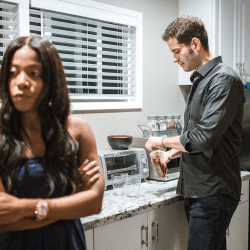
You think you’re in control, you think you’ve got the relationship game on lock. But you’re telling yourself the wrong stories. Every time you dodge accountability, you’re spinning a narrative that keeps you safe. It’s time to stop the flattering mirror and face the truth.
“I’m busy with work, she should understand.”

While you’re scheduling calls with clients, you’re missing the calls your partner wants to make with you. Deflecting responsibility in a relationship undermines trust and emotional safety. You’re choosing where you put your time. You’re short-circuiting the problem instead of owning it.
“If she really loved me, she wouldn’t say that.”

You flip the script onto her when you hear something that stings. Instead of asking what you did or didn’t do, you use deflection. Owning your part breaks the binary of “victim vs offender.” Pop open your own reflection and ask: what did I do to make her feel this way?
“This is just how I am.”

You’re using your personality as a shield. In a relationship, being yourself doesn’t mean being unchecked. Therapists say people who don’t take accountability often hide behind permanence: “This is how I’ve always been.” If you want to upgrade your relationship game, you can evolve. And it takes work.
“She’s just too emotional.”

You avoided being in the space where her feelings were pointing at something you did. Taking accountability means stepping in. The more you feel like you’re defending a mountain, the more likely you’ve ignored the trail of pebbles she tried to drop.
“If I apologize all the time, I’ll look weak.”

You’re constantly guarding your status, your image. You think a real man doesn’t fall to his knees in front of his partner. The real man knows when he’s wrong, says sorry, and means it. Rejecting blame isn’t the same as owning your role and without this, you stall emotional growth in the relationship.
“She knows I’m working on it.”

Real accountability shows through consistent action. Men often say they’re changing, but haven’t connected what they did to how it affected someone else. So, you, telling yourself, “I’m working on it,” is just you delaying the hard part: proving it.
“I only blew up because she pushed me.”

You explode, then act victim. But accountability means owning your trigger and reaction. Being pushed is real, but you have a choice how you respond. When you say “she made me,” you give away your power. And in relationships, the man who holds his power chooses his response. He doesn’t blame the push.
“At least I’m not doing what he did.”

You compare yourself to some other guy “I’m better than him.” That’s fine for your ego, but lousy for your growth. It’s like you’re measuring in second place and calling it a win. Shameless men often hide behind the story of “I’m not that guy,” instead of doing the work.
If you anchor your value to not being someone else, you skip the part where you ask: “What kind of guy do I want to be?”
“It’s not my job to fix her.”

You helped create part of the environment she’s in. Accountability means seeing the ripple. You’re not the lifeguard of her emotional ocean, but you’re in the water. You’re contributing waves. So you can’t ignore the splash. When you say “It’s not my job,” you’re avoiding the part that is yours.
“We argued because I don’t like fighting.”

You’ll say this with a sigh. It implies you’re the reasonable guy. But you just fight differently: silence, walk-out, and avoidance. Fighting isn’t just a shout match. It’s how you handle the clash. Recognize your avoidance as part of your pattern. Because hiding from conflict is still conflict.
“I told her what would happen.”

You set boundaries and gave warnings. But then you walk away when she crosses them, and you feel justified. Accountability is owning the outcome. You should live by integrity. Because living by threats is control, living by integrity is trust.
“I’m just being honest.”

There’s weaponized honesty. You might say things like “I’m not like other guys,” or “You’re insecure,” under the banner of honesty. But honesty without empathy is a knife. Whenever you say that as a shield, you’re dodging compassion. Real accountability mixes truth with respect for her humanity.
“She chose this lifestyle too.”

You aren’t absolved from how you handle the fallout. You may have walked in with open eyes, but if you turned blind then, you still share blame. Accountability doesn’t let past consent serve as future absolution. Choices matter, but so does what you do after the results show.
“I’m just having a rough period.”

Everyone hits rough patches. But your rough patch doesn’t get to be the excuse for neglecting the partnership. If you’re tired, stressed, burnt out, step up and say it. You don’t ghost and disengage. You don’t let your unavailable self become the normal. Using rough period to dodge accountability is a red flag.
“It’s just who I am with friends.”

You act one way with your buddies, another with her, and you pretend it doesn’t affect the relationship. But it does. Your identity with friends bleeds into your identity with her. If you’re dismissive, aloof, or constantly “one of the guys” while ignoring your relationship, you’re telling yourself “that’s separate” when it isn’t. The healthier man integrates both worlds with respect.
“My intentions were good.”

Intent matters, but it doesn’t equal impact. You may have meant well, but she’s left picking up the pieces. Owning your part doesn’t mean brushing off your partner’s hurt because your shoes looked shiny. Taking accountability is validating the impact.
“She asked for space, I gave it.”

Space is healthy. But ghosting is avoidance. That’s an exit. When you actually respect space, you check in, set a timeframe, and communicate. If she’s feeling cut off and you say, “But I gave you space,” you just told yourself you dodged the fight instead of facing your part.
“Someday things will just click.”

You’re playing the long game of hope, thinking if you ride it out, she’ll get fed up or you’ll wake up one day as the version you imagine. Relationships don’t fix themselves because you’ve been meaning to fix yourself. They advance when you act.






Ask Me Anything